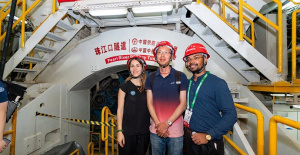VALENCIA, July 27 (EUROPA PRESS) -
The Incliva Health Research Institute, of the Hospital Clínico de València, has conducted a clinical trial that has shown the effectiveness of the insertion of Polyethylene glycol patches in the cavity obtained after the removal of axillary lymph nodes in patients with breast cancer, such as alternative to the usual suction drains in the postoperative period.
These drains mean a greater number of hospital visits, due to discomfort due to pain and the risk of spontaneous exit of the drainage tube, development of seroma -a serous liquid, coming from the blood plasma, which accumulates under the incision- - and even bleeding, and also a greater number of infections, which have a negative impact on the quality of life of these patients, Incliva reported in a statement.
The Polyethylene glycol patch is a hemostatic sealant that is applied directly to moist tissue --in this case, the axillary space-- combining two processes: sealing the surface and reducing bleeding.
Los resultados de este ensayo acaban de publicarse recientemente en British Journal of Surgery, en el artículo ‘Clinical and cost outcomes of a polyethylene glycol (PEG)-coated patch versus drainage after axillary lymph node dissection in breast cancer: results from a multicentre randomized clinical trial’.
The principal investigator of this study was Dr. Elvira Buch, from the Incliva Breast Cancer Biology Research Group; Head of the Department of General Surgery and Coordinator of the Breast Unit at the Hospital Clínico de València; and associate professor at the CEU Cardenal Herrera University.
This multicenter, randomized and prospective study was carried out throughout the Spanish territory with the participation, in addition to Incliva, of the Surgery Departments of the Hospital Clínico, Hospital General and Hospital La Fe, from Valencia; General Hospital of Alicante; Requena Hospital; Clinical Hospital of Santiago de Compostela; Antequera Hospital (Malaga); San Pedro Hospital (Logroño); and the Marqués de Valdecilla Clinical Hospital (Santander); in addition to the Valencian Institute of Oncology (IVO).
Dr Buch explained that the aim of the trial was to see if patients with axillary lymphadenectomy could be spared from wearing the drain postoperatively, "in order to improve their quality of life in the weeks following surgery."
Axillary lymphadenectomy or axillary dissection is a surgery performed in the armpit area to evaluate the lymph nodes affected by breast cancer and, thus, to be able to decide on the best cancer treatment. When a person has breast cancer, cancer cells may spread through the lymphatic system and reach these nodes.
The starting point for this trial were studies in other pathologies that decreased postoperative seroma, which affects between 30% and 40% of women with breast cancer who underwent axillary lymphadenectomy, causing swelling in the area that generates them. discomfort to move the arm, makes rehabilitation exercises after surgery impossible and may even be the reason for delaying cancer treatments after surgical treatment.
The purpose was to try to avoid suction drainage that was performed on all women in the postoperative period, given their complaints about discomfort, in addition to assessing the decrease or increase in seroma with the patch and drain. The study began in 2020 with the recruitment of patients. Almost 250 women with breast-conserving surgery (without breast removal) participated in two study groups.

 Exploring Cardano: Inner Workings and Advantages of this Cryptocurrency
Exploring Cardano: Inner Workings and Advantages of this Cryptocurrency Seville.- Economy.- Innova.- STSA inaugurates its new painting and sealing hangar in San Pablo, for 18 million
Seville.- Economy.- Innova.- STSA inaugurates its new painting and sealing hangar in San Pablo, for 18 million Innova.- More than 300 volunteers join the Andalucía Compromiso Digital network in one month to facilitate access to ICT
Innova.- More than 300 volunteers join the Andalucía Compromiso Digital network in one month to facilitate access to ICT Innova.-AMP.- Ayesa acquires 51% of Sadiel, which will create new technological engineering products and expand markets
Innova.-AMP.- Ayesa acquires 51% of Sadiel, which will create new technological engineering products and expand markets Abascal (Vox) criticizes that Sánchez is "victimizing" himself and calls for elections after his possible resignation
Abascal (Vox) criticizes that Sánchez is "victimizing" himself and calls for elections after his possible resignation Carlos Alcaraz reaches the round of 16 in Madrid without breaking a sweat
Carlos Alcaraz reaches the round of 16 in Madrid without breaking a sweat Some 5,000 people demonstrate in front of Congress for democracy, hours before Sánchez's decision
Some 5,000 people demonstrate in front of Congress for democracy, hours before Sánchez's decision STATEMENT: Intelligent systems used in the construction of the deepest underwater tunnel in China
STATEMENT: Intelligent systems used in the construction of the deepest underwater tunnel in China How Blockchain in being used to shape the future
How Blockchain in being used to shape the future Not just BTC and ETH: Here Are Some More Interesting Coins Worth Focusing on
Not just BTC and ETH: Here Are Some More Interesting Coins Worth Focusing on UPV students build a prototype of a wooden house to move to Equatorial Guinea
UPV students build a prototype of a wooden house to move to Equatorial Guinea The UA opens the call for the Impulso 2024 Awards for the best innovative business initiatives
The UA opens the call for the Impulso 2024 Awards for the best innovative business initiatives ALI, virtual assistant from Alicante, internationally recognized by the OECD
ALI, virtual assistant from Alicante, internationally recognized by the OECD Retrópolis brings the golden age of video games and computing to the UPV
Retrópolis brings the golden age of video games and computing to the UPV A million people demonstrate in France against Macron's pension reform
A million people demonstrate in France against Macron's pension reform Russia launches several missiles against "critical infrastructure" in the city of Zaporizhia
Russia launches several missiles against "critical infrastructure" in the city of Zaporizhia A "procession" remembers the dead of the Calabria shipwreck as bodies continue to wash up on the shore
A "procession" remembers the dead of the Calabria shipwreck as bodies continue to wash up on the shore Prison sentences handed down for three prominent Hong Kong pro-democracy activists
Prison sentences handed down for three prominent Hong Kong pro-democracy activists ETH continues to leave trading platforms, Ethereum balance on exchanges lowest in 3 years
ETH continues to leave trading platforms, Ethereum balance on exchanges lowest in 3 years Investors invest $450 million in Consensys, Ethereum incubator now valued at $7 billion
Investors invest $450 million in Consensys, Ethereum incubator now valued at $7 billion Alchemy Integrates Ethereum L2 Product Starknet to Enhance Web3 Scalability at a Price 100x Lower Than L1 Fees
Alchemy Integrates Ethereum L2 Product Starknet to Enhance Web3 Scalability at a Price 100x Lower Than L1 Fees Mining Report: Bitcoin's Electricity Consumption Declines by 25% in Q1 2022
Mining Report: Bitcoin's Electricity Consumption Declines by 25% in Q1 2022 Oil-to-Bitcoin Mining Firm Crusoe Energy Systems Raised $505 Million
Oil-to-Bitcoin Mining Firm Crusoe Energy Systems Raised $505 Million Microbt reveals the latest Bitcoin mining rigs -- Machines produce up to 126 TH/s with custom 5nm chip design
Microbt reveals the latest Bitcoin mining rigs -- Machines produce up to 126 TH/s with custom 5nm chip design Bitcoin's Mining Difficulty Hits a Lifetime High, With More Than 90% of BTC Supply Issued
Bitcoin's Mining Difficulty Hits a Lifetime High, With More Than 90% of BTC Supply Issued The Biggest Movers are Near, EOS, and RUNE during Friday's Selloff
The Biggest Movers are Near, EOS, and RUNE during Friday's Selloff Global Markets Spooked by a Hawkish Fed and Covid, Stocks and Crypto Gain After Musk Buys Twitter
Global Markets Spooked by a Hawkish Fed and Covid, Stocks and Crypto Gain After Musk Buys Twitter Bitso to offset carbon emissions from the Trading Platform's ERC20, ETH, and BTC Transactions
Bitso to offset carbon emissions from the Trading Platform's ERC20, ETH, and BTC Transactions Draftkings Announces 2022 College Hoops NFT Selection for March Madness
Draftkings Announces 2022 College Hoops NFT Selection for March Madness























